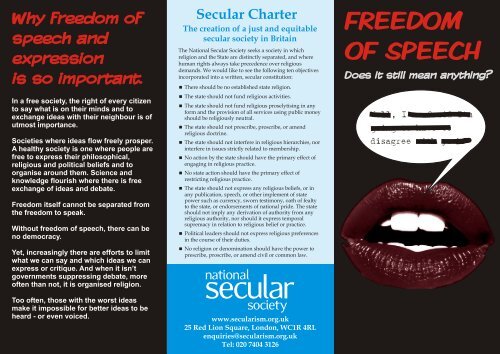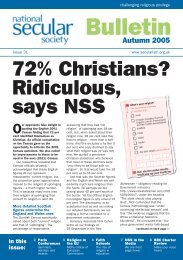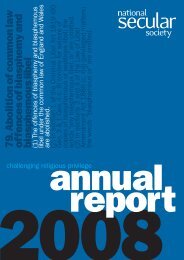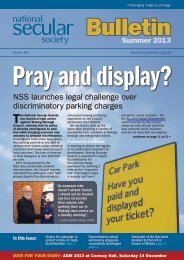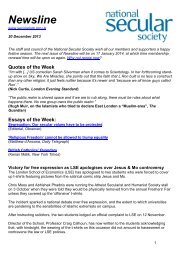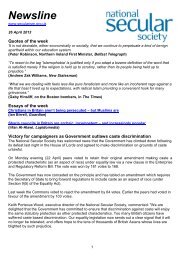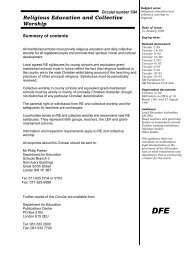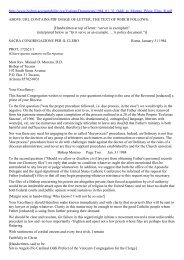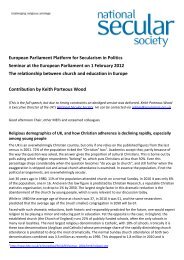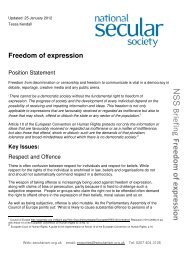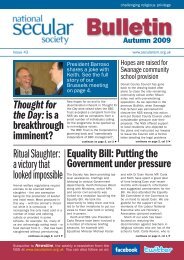FREEDOM OF SPEECH - National Secular Society
FREEDOM OF SPEECH - National Secular Society
FREEDOM OF SPEECH - National Secular Society
Create successful ePaper yourself
Turn your PDF publications into a flip-book with our unique Google optimized e-Paper software.
Why freedom of<br />
speech and<br />
expression<br />
is so important.<br />
In a free society, the right of every citizen<br />
to say what is on their minds and to<br />
exchange ideas with their neighbour is of<br />
utmost importance.<br />
Societies where ideas flow freely prosper.<br />
A healthy society is one where people are<br />
free to express their philosophical,<br />
religious and political beliefs and to<br />
organise around them. Science and<br />
knowledge flourish where there is free<br />
exchange of ideas and debate.<br />
Freedom itself cannot be separated from<br />
the freedom to speak.<br />
Without freedom of speech, there can be<br />
no democracy.<br />
Yet, increasingly there are efforts to limit<br />
what we can say and which ideas we can<br />
express or critique. And when it isn’t<br />
governments suppressing debate, more<br />
often than not, it is organised religion.<br />
Too often, those with the worst ideas<br />
make it impossible for better ideas to be<br />
heard - or even voiced.<br />
<strong>Secular</strong> Charter<br />
The creation of a just and equitable<br />
secular society in Britain<br />
The <strong>National</strong> <strong>Secular</strong> <strong>Society</strong> seeks a society in which<br />
religion and the State are distinctly separated, and where<br />
human rights always take precedence over religious<br />
demands. We would like to see the following ten objectives<br />
incorporated into a written, secular constitution:<br />
§<br />
§<br />
There should be no established state religion.<br />
The state should not fund religious activities.<br />
§ The state should not fund religious proselytising in any<br />
form and the provision of all services using public money<br />
should be religiously neutral.<br />
§ The state should not prescribe, proscribe, or amend<br />
religious doctrine.<br />
The state should not interfere in religious hierarchies, nor<br />
§<br />
interfere in issues strictly related to membership.<br />
No action by the state should have the primary effect of<br />
§<br />
engaging in religious practice.<br />
No state action should have the primary effect of<br />
§<br />
restricting religious practice.<br />
§ The state should not express any religious beliefs, or in<br />
any publication, speech, or other implement of state<br />
power such as currency, sworn testimony, oath of fealty<br />
to the state, or endorsements of national pride. The state<br />
should not imply any derivation of authority from any<br />
religious authority, nor should it express temporal<br />
supremacy in relation to religious belief or practice.<br />
§ Political leaders should not express religious preferences<br />
in the course of their duties.<br />
No religion or denomination should have the power to<br />
§<br />
prescribe, proscribe, or amend civil or common law.<br />
www.secularism.org.uk<br />
25 Red Lion Square, London, WC1R 4RL<br />
enquiries@secularism.org.uk<br />
Tel: 020 7404 3126<br />
<strong>FREEDOM</strong><br />
<strong>OF</strong> <strong>SPEECH</strong><br />
Does it still mean anything?<br />
Well, I’m afraid I’m<br />
going to have to<br />
disagree with you!
THE THREAT TO<br />
Freedom of Speech<br />
Freedom of expression is under unprecedented threat.<br />
Any broadcaster, commentator, or newspaper editor –<br />
whether from the left or the right – will confirm that they are<br />
operating under greater restrictions than they were ten, or<br />
even five years ago. For them, and their proprietors, selfcensorship<br />
is rife, and is growing. They are worried about<br />
powerful, well-financed and litigious religious groups, as well<br />
as the criminal law.<br />
Until relatively recently, we have taken for granted our<br />
freedom to argue, offend and mock.<br />
But now there is a definite chill in the air surrounding free<br />
debate. Suddenly there is an insistent demand especially<br />
from some religious groups that we curtail what we say. We<br />
should respect their sensitivities, even if they do not respect<br />
ours, we shouldn't offend them however offended we are, and<br />
we shouldn't insult them, however insulted we are.<br />
We have heard much in recent years from those intent on<br />
closing down freedom of speech, and so have newspaper<br />
editors who quake with some of the demands made of them.<br />
Most of the threats to free expression come from an<br />
unhealthy and growing alliance between some religious<br />
groups and the State.<br />
What do you think that the following have in common:<br />
Salman Rushdie's The Satanic Verses; Jerry Springer the<br />
Opera being broadcast by the BBC; and the Sikh play Behzti<br />
being staged in Birmingham? One answer is that all these<br />
protests were religiously motivated. The other is that no<br />
Is freedom of speech relevant?<br />
“Defence of free speech and expression is intrinsically<br />
linked to the defence of other rights. You cannot defend<br />
one without also defending the right to asylum, the<br />
right to strike and organise, labour rights, women's and<br />
children's rights, the right to live in a secular society,<br />
the right to equality and freedom, universal<br />
rights, the right to religion or atheism and<br />
belief as a private matter, the right<br />
to live lives worthy of 21st century<br />
humanity. You cannot defend<br />
humanity without defending its<br />
right to speak and express itself.”<br />
Maryam Namazie<br />
Iranian <strong>Secular</strong>ist<br />
prosecutions were taken out against those known to have<br />
broken the law in connection with the protests. This sends out<br />
a powerful and worrying signal: that the authorities do not<br />
value freedom of speech and will do nothing to protect it,<br />
especially if protests are religiously motivated.<br />
The chilling effects and self censorship are already a very<br />
worrying feature in the UK today.<br />
Free speech is a vital element of democracy and an<br />
essential tool to resolve contentious issues peacefully. Driving<br />
dissent underground impedes resolution and allows<br />
extremism to fester and extremists to thrive.<br />
Furthermore, we should not allow the censors to control<br />
our cultural agenda - banning plays, having TV programmes<br />
taken off, burning books. We should be affronted and<br />
outraged by the attempts of religious extremists of all stripes<br />
to rob us of our artistic heritage, our right to question, mock<br />
and make fun of even the most revered ideologies. We must<br />
resist.<br />
There must not be a right not to be offended in the UK,<br />
perhaps the most religiously diverse country in the world.<br />
The Voltarian principle of hating what you say, but<br />
defending your right to say it, is easy to recite, but so much<br />
harder to put into practice.<br />
But, if we are to live together successfully and<br />
harmoniously in all our diversity we must all embrace<br />
freedom of expression.<br />
What is the “Chilling Effect”?<br />
The "chilling effect" is an expression used to describe a<br />
situation where people or organisations self-censor<br />
their speech or writing for fear of attracting expensive<br />
libel suits or because they're intimidated by the threat<br />
of a violent response. Freedom of thought and<br />
expression cannot flourish under such duress and the<br />
free flow of ideas, information and knowledge suffers<br />
accordingly, often to the detriment of society and the<br />
progress of science and medicine.<br />
The “chilling effect” suggests that freedom of<br />
speech and expression can be stifled not because of<br />
any law but by the fear generated by aggressive libel<br />
actions or violence.<br />
In short, people are bullied into silence.<br />
Gay Jesus and<br />
Salman Rushdie<br />
There are two principle means by which<br />
the opponents of free speech suppress<br />
ideas they dislike or criticisms they'd rather<br />
not hear. The first is through using the courts<br />
– so-called 'lawfare' – and the second is<br />
through the use of violence and intimidation –<br />
or the threat of violence.<br />
There have been two iconic cases – an<br />
example of each of these forms of attack on<br />
free expression. The first followed the<br />
publication of a poem "The Love that Dares to<br />
Speak its Name" (which sexualised Jesus) in<br />
Gay News. Christian campaigner Mary<br />
Whitehouse brought a private prosecution and secured<br />
a conviction against the editor, Denis Lemon. Though the<br />
Blasphemy Law was finally scrapped in 2007, there have<br />
been repeated attempts to extend it and re-introduce it by<br />
stealth through so-called “religious hatred” laws.<br />
Obviously people who incite hatred of religious<br />
minorities are contemptible, but there is existing legislation<br />
covering incitement and public order to deal with this. These<br />
laws have a chilling effect on legitimate criticism of religious<br />
ideas and practices.<br />
The second example involved direct threats to kill an<br />
author and to intimidate any shops or libraries that kept his<br />
book. The fatwa against author Salman Rushdie in 1988<br />
more than any other single incident put the issue of free<br />
speech on the public agenda. Unfortunately the threat of<br />
violence and public disorder has proven very effective and<br />
few are prepared to stand up to it. For example: In 2004<br />
after violent protests among the city's Sikh community, the<br />
Birmingham Repertory Theatre closed the<br />
play Behzti which offended<br />
some Sikh extremists.<br />
In 2006, the Asia<br />
House abruptly<br />
cancelled the painting<br />
exhibition of Indian<br />
artist MF Hussain citing<br />
"security" grounds after<br />
protests by radical<br />
Hindus.<br />
In 2008, a<br />
Waterstones book<br />
shop cancelled a<br />
reading by poet Patrick<br />
Jones after a group<br />
calling itself Christian<br />
Voice threatened to<br />
cause a disruption.


